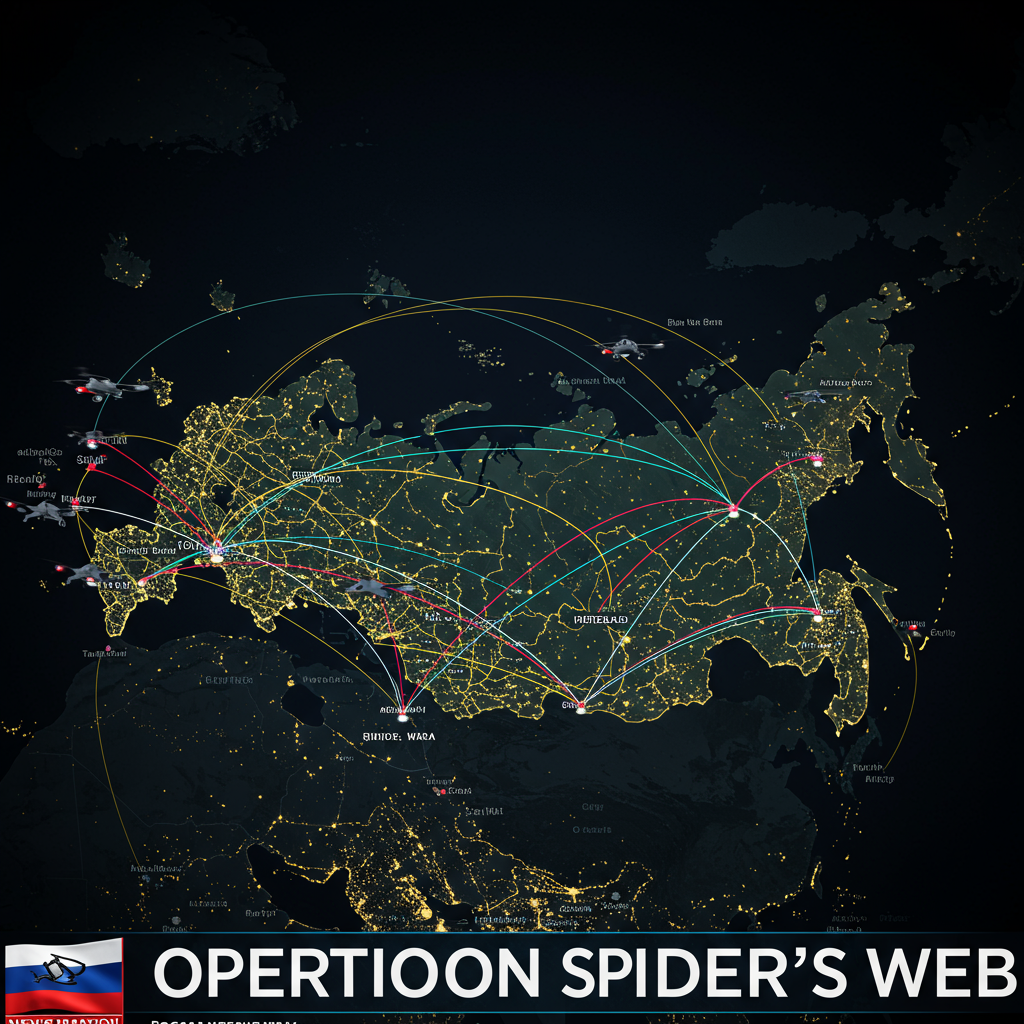Ukraine has demonstrated extraordinary audacity and ingenuity with a recent, countrywide drone attack targeting Russian airbases. This complex operation, reportedly codenamed “Operation Spider’s Web,” represents a significant moment in the conflict, serving as a powerful message delivered hundreds, even thousands, of miles deep into Russian territory.
While Ukrainian claims of widespread damage, potentially totaling billions, are difficult to independently verify, it’s clear that “Operation Spider’s Web” achieved a spectacular propaganda coup. Ukrainians are already comparing this feat to previous landmark successes against Russia, such as the sinking of the Black Sea Fleet flagship Moskva and the bombing of the Kerch Bridge in 2022, and the missile strike on Sevastopol harbour in 2023. Many view this latest drone offensive as Ukraine’s most elaborate achievement yet.
Behind “Operation Spider’s Web”: An Unprecedented Strategy
Details reportedly leaked by Ukraine’s SBU military intelligence reveal the incredible planning behind this attack. The operation is said to have been 18 months in the making, involving the smuggling of scores of small drones into Russia. These drones were hidden in specially constructed compartments aboard freight trucks. The trucks then drove the unmanned aerial vehicles (UAVs) vast distances to at least four different locations across Russia before the drones were launched remotely towards nearby airbases.
Defence analyst Serhii Kuzan commented on the unprecedented nature of the operation, stating, “No intelligence operation in the world has done anything like this before.” He highlighted the significance of targeting Russian strategic bombers, which are capable of launching long-range missile strikes against Ukraine. Kuzan claimed that Ukraine managed to strike 40 out of Russia’s estimated 120 strategic bombers, an “incredible figure.”
Assessing the Impact on Russia’s Air Force
While the full extent of physical damage remains challenging to confirm definitively, Ukrainian military blogger Oleksandr Kovalenko argues that the impact is substantial, even if aircraft weren’t entirely destroyed. According to Kovalenko, the damage is severe enough that “the Russian military-industrial complex, in its current state, is unlikely to be able to restore them in the near future.”
The primary targets included critical Russian strategic missile-carrying bombers: the Tu-95, Tu-22, and the supersonic Tu-160. Kovalenko points out that these aircraft types are no longer in production, making complex repairs difficult and complete replacement impossible. He particularly stressed the potential loss of the rare Tu-160s, describing them as “truly two unicorns in the herd.” The disruption and potential loss of such high-value, irreplaceable assets significantly degrade Russia’s long-range strike capabilities.
A Critical Message Beyond Physical Damage
Beyond the operational impact and potential physical damage, “Operation Spider’s Web” carries a crucial political and strategic message, directed at both Russia and, significantly, at Ukraine’s Western allies.
Drawing on reporting from the BBC Ukrainian Service, a Ukrainian government official expressed deep frustration with the prevailing sentiment among some Western partners, particularly within the United States, that Ukraine is losing or has already lost the war. “The biggest problem,” the official stated, “is that the Americans have convinced themselves we’ve already lost the war. And from that assumption everything else follows.” This assumption, the official suggested, leads some in the West to believe their role is to negotiate “the softest possible terms of surrender” for Ukraine – a notion Kyiv vehemently rejects. “We don’t believe we’ve been defeated,” the official asserted, explaining why gratitude for such perceived efforts is not forthcoming.
This sentiment resonated across Ukrainian commentary. Defence journalist Illia Ponomarenko linked the attack on social media (X) to countering those who have prematurely dismissed Ukraine’s chances with statements like “‘Ukraine has only six months left’,” “‘You have no cards’,” or “‘Just surrender for peace, Russia cannot lose’.” Similarly, the quarterly Business Ukraine journal proudly declared via tweet, “It turns out Ukraine does have some cards after all. Today Zelensky played the King of Drones.”
Ukraine’s Stance: Still in the Fight
As Ukrainian delegates arrive for potential ceasefire negotiations, this audacious drone attack serves as their most potent argument: Ukraine is still in the fight and capable of striking back effectively and innovatively. Despite Russia’s slow, grinding advances on certain battlefields, particularly in the Donbas, this operation is a clear statement to Moscow, and to any in the West harbouring defeatist views, that Kyiv’s prospects should not be so easily dismissed. The “King of Drones” has made his move, underlining Ukraine’s determination and capacity to continue resisting.
References
- https://www.bbc.com/news/articles/c0r1jv0rn0ko
- https://www.bbc.co.uk/news/articles/c0r1jv0rn0ko
- https://www.aol.com/news/ukraines-audacious-drone-attack-sends-205807911.html
- https://www.dailyindependent.com.pk/2025/06/01/ukraines-audacious-drone-attack-sends-critical-message-to-russia-and-the-west/




